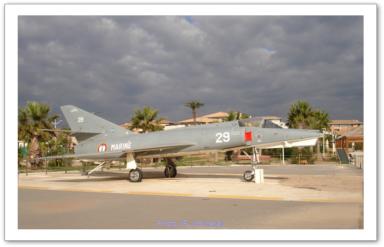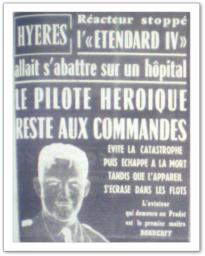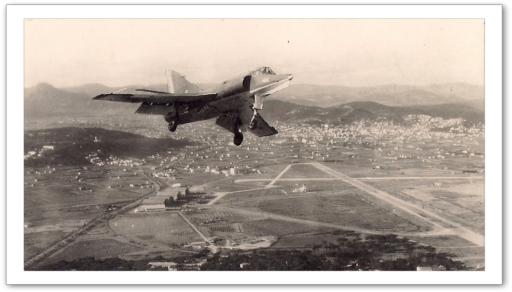On 27 September 1963, the Etendard IV led by Charles Bonderff crashed at sea, narrowly avoiding a disaster that might fall on hospitals Almanarre.  Etendard IV |  The Etendard IV is a light attack aircraft built by Dassault and to be flown aboard the aircraft carrier Foch and Clemenceau. Built in 90 copies, operated from 1962 to 2000 in the French Navy, he participated in some conflicts: Lebanon, Kosovo, Yugoslavia. Photo JP Joncheray The Etendard IV is a light attack aircraft built by Dassault and to be flown aboard the aircraft carrier Foch and Clemenceau. Built in 90 copies, operated from 1962 to 2000 in the French Navy, he participated in some conflicts: Lebanon, Kosovo, Yugoslavia. Photo JP Joncheray | Features
| Constructeur |
Dassault Aviation |
| Mise en service |
1962 |
| First flight |
21 may 1958 |
| Retrait |
2000 |
| Scale |
9.6 m |
| Longueur |
14.53 m |
| High |
4 .3 m |
| Surface |
29 m� |
| Massse � vide |
5900 Kg |
| Masse pleine charge |
10200 Kg |
| Vitesse maximimun |
1100 Km/h |
| Roof |
15500 m |
| Range. |
600 Km |
| R�acteur |
SNECMA Atar - 4400Kg de puissance |
| Internal armament |
Two 30 mm guns |
| External armament |
1300kg load (bombs, missiles, etc. ..) |
| Nombre produit |
90 |
|
|  L'accident |  On September 27, 1963, IV Etenard flown by the first master of the Charles Bonderff 15F squadron during a training flight at low altitude navigation, crashed at sea in narrowly avoiding a disaster. Its reactor exploded in flight in part due to rupture of a compressor blade. The plane, almost uncontrollable, was heading to hospitals Almanarre. The bravery of the first master, despite the fall of the aircraft, the plane headed across the Gulf of Giens, awaiting the final moment to eject. Two witnesses present at the surreal scene and carried the pilot assistance with a boat. The wreckage was recovered, at least partially, work having been abandoned by the Navy because of Mistral. On September 27, 1963, IV Etenard flown by the first master of the Charles Bonderff 15F squadron during a training flight at low altitude navigation, crashed at sea in narrowly avoiding a disaster. Its reactor exploded in flight in part due to rupture of a compressor blade. The plane, almost uncontrollable, was heading to hospitals Almanarre. The bravery of the first master, despite the fall of the aircraft, the plane headed across the Gulf of Giens, awaiting the final moment to eject. Two witnesses present at the surreal scene and carried the pilot assistance with a boat. The wreckage was recovered, at least partially, work having been abandoned by the Navy because of Mistral. |
|  Identification |  | It was during a recreational scuba divers are our fallen debris on an aircraft. A long and tedious work of identifying began. The Gulf of Giens is located near a naval air base, coupled with the fact that the conflict of World War II shipwrecks have provided, it gives a wide range of possibilities for the determination of the plane discovered in April 2010. After a meticulous, divers AREVPAM archaeologists have begun to scrutinize each piece of sheet metal, whatever its appearance. Often, the clues are revealed in mundane places, the smallest debris is never without interest. This work shows a series of numbers, then an international search to museums, scholars and fans that we never thank enough, the numbers speak well ... we are in the presence of the Etendard IVM having sunk the famous September 27, 1963.
|
|
|